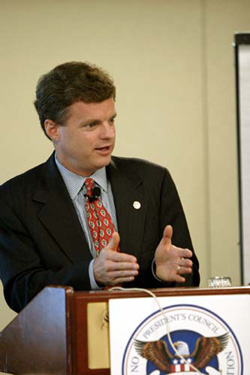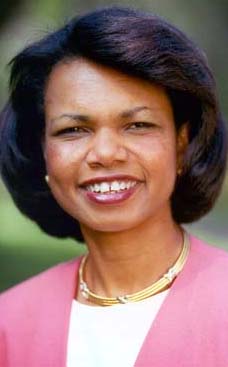2006.03.08: March 8, 2006: Headlines: Figures: USA Freedom Corps: Washington Times: John Bridgeland says the future of the compassion agenda will require smarter policies to help those prosperity has left behind
Peace Corps Online:
Peace Corps News:
Peace Corps Library:
USA Freedom Corps:
January 23, 2005: Index: PCOL Exclusive: USA Freedom Corps :
2006.03.08: March 8, 2006: Headlines: Figures: USA Freedom Corps: Washington Times: John Bridgeland says the future of the compassion agenda will require smarter policies to help those prosperity has left behind
John Bridgeland says the future of the compassion agenda will require smarter policies to help those prosperity has left behind

"Compassionate conservatism also recognizes government's responsibility to help those with special needs, but in a way that moves them toward independence. In specific areas -- drug treatment, adoption and foster care, Americans with disabilities, homeownership, education and more -- the compassion agenda is true to principle and showing good progress. " John Bridgeland of Ohio was the first head of President George W. Bush's USA Freedom Corps.
John Bridgeland says the future of the compassion agenda will require smarter policies to help those prosperity has left behind
An agenda of compassion that works
By John Bridgeland and Stephen Goldsmith
March 8, 2006
The president submitted a domestic budget this week that slows increases in domestic programs. Rather than evaluating the changes, critics will claim they are hard-hearted.
Welfare reform tells us the Beltway definition of compassion -- how much money is appropriated to an existing program -- misses the point.
We con-coms worry about how policy affects vulnerable populations, including the 18 million children at risk of not reaching productive adulthood. The obstacles they face make it unlikely they will experience the American Dream, eroding civil society and the common values that hold our cities and country together.
Programs should be cut or increased based on how likely they are to change these conditions. The last four years brought a quiet transformation in how government delivers social services to the disadvantaged. "Compassionate conservatism" neither dismissed the obligations of the federal government nor allowed it a monopoly on good deeds.
The underlying belief is that most people have the capacity to run their own lives to be self-governing citizens, not passive clients of government. The work of compassion is not funding more government programs delivered through failing, distant bureaucracies, but unleashing more citizens and charities and insisting on results.
We do not need to federalize citizen service, but to ensure that sensible federal investments leverage additional volunteers who produce outcomes such as improving literacy, and helping more children reach productive adulthood. Presidential leadership, a surge in interest by young adults and new service initiatives helped mobilize 65 million regular volunteers last year, up 6 million from the year after September 11, and helped produce a record number of national service participants, supporting efforts such as City Year, Earth Conservation Corps and Habitat for Humanity. Partisan battles put these programs at risk.
Civic health also depends on the strength of community institutions, and faith-based groups remain the predominant neighborhood organization. We should understand that in some cases the key element that helps transform lives for the better is faith, while recognizing that faith-based institutions are effective partners in delivering social services apart from the lessons they preach. While more than $1 billion has been opened up for faith-based institutions that are showing results in helping the disadvantaged, the legislative agenda has languished to the detriment of the poor and suffering.
Compassionate conservatism also recognizes government's responsibility to help those with special needs, but in a way that moves them toward independence. In specific areas -- drug treatment, adoption and foster care, Americans with disabilities, homeownership, education and more -- the compassion agenda is true to principle and showing good progress.
To realize the full potential of the compassion agenda, here's what might be done:
Focus on core values. The best poverty prevention is reducing teen pregnancy and strengthening families. The recently signed welfare reauthorization values marriage and work. More needs to be done to support abstinence education, encourage fathers to stay connected to their families, and get more children to finish high school and find productive work.
Congress should make permanent the USA Freedom Corps legacy -- in domestic, homeland security and international programs -- so the armies of compassion can continue to be deployed. Congress might also require government agencies to produce "civic impact statements" to spur them to leverage government resources to dramatically expand volunteers who could tap both the first wave of Baby Boomers and the surge of youthful volunteers.
Congress should revitalize the faith-based initiative, making vouchers more widely available so that individuals can choose social services that are best for them. Congress also should support interfaith partnerships to tackle tough problems, which would help the needy and foster peace among religions that share a common Abrahamic tradition. In both cases, government could not be accused of funding religion.
Congress and the Bush administration should reach an additional 2 million children, including children of prisoners, with caring adult mentors, and fund school-based and faith-based groups that can rapidly produce mentors in low-income communities. Mentoring has been shown to improve academic performance and reduce risky behaviors.
The future of the compassion agenda will require smarter policies to help those prosperity has left behind. The poor and needy are the quiet constituency. All the more reason that members of Congress, governors and other policy-makers should embrace the compassion agenda and stake a leadership claim on helping those most in need in their districts and states.
John M. Bridgeland, CEO of Civic Enterprises, served as director of the White House Domestic Policy Council under President Bush. Stephen Goldsmith, chairman of the Corporation for National and Community Service and a professor at Harvard University, served as domestic policy adviser for Bush for President.
When this story was posted in March 2006, this was on the front page of PCOL:





Peace Corps Online The Independent News Forum serving Returned Peace Corps Volunteers
 | History of the Peace Corps
PCOL is proud to announce that Phase One of the "History of the Peace Corps" is now available online. This installment includes over 5,000 pages of primary source documents from the archives of the Peace Corps including every issue of "Peace Corps News," "Peace Corps Times," "Peace Corps Volunteer," "Action Update," and every annual report of the Peace Corps to Congress since 1961. "Ask Not" is an ongoing project. Read how you can help. |
 | The Peace Corps Library
The Peace Corps Library is now available online with over 40,000 index entries in 500 categories. Looking for a Returned Volunteer? Check our RPCV Directory. New: Sign up to receive PCOL Magazine, our free Monthly Magazine by email. Like to keep up with Peace Corps news as it happens? Sign up to recieve a daily summary of Peace Corps stories from around the world. |
 | Peace Corps suspends program in Bangladesh
Peace Corps Director Gaddi H. Vasquez announced the suspension of the Peace Corps program in Bangladesh on March 15. The safety and security of volunteers is the number one priority of the Peace Corps. Therefore, all Peace Corps volunteers serving in Bangladesh have safely left the country. More than 280 Peace Corps volunteers have served in Bangladesh since the program opened in November 1998. Latest: What other newspapers say. |
 | Invitee re-assigned after inflammatory remarks
The Peace Corps has pulled the invitation to Derek Volkart to join the Morocco Training Program and offered him a position in the Pacific instead after officials read an article in which he stated that his decision to join the Peace Corps was in "response to our current fascist government." RPCV Lew Nash says that "If Derek Volkart spoke his mind as freely in Morocco about the Moroccan monarchy it could cause major problems for himself and other Peace Corps volunteers." Latest: The Ashland Daily Tidings has issued a request for all Peace Corps communications on the case. |
 | Re-envision Peace Corps
Nicholas J. Slabbert says in his article in the Harvard International Review that an imaginatively reinvented Peace Corps could powerfully promote US interests in a period when perceptions of American motives are increasingly relevant to global realignment. His study envisions a new role for the Peace Corps in five linked areas: (1) reinventing America's international profile via a new use of soft power; (2) moving from a war-defined, non-technological, reactive theory of peace to a theory of peace as a normal, proactive component of technologically advanced democracy; (3) reappraising Peace Corps as a national strategic asset whose value remains largely untapped; (4) Peace Corps as a model for the technological reinvention of government agencies for the 21st century; (5) redefining civil society as information technology society. Read the article and leave your comments. |
 | March 1, 1961: Keeping Kennedy's Promise
On March 1, 1961, President John F. Kennedy issues Executive Order #10924, establishing the Peace Corps as a new agency: "Life in the Peace Corps will not be easy. There will be no salary and allowances will be at a level sufficient only to maintain health and meet basic needs. Men and women will be expected to work and live alongside the nationals of the country in which they are stationed--doing the same work, eating the same food, talking the same language. But if the life will not be easy, it will be rich and satisfying. For every young American who participates in the Peace Corps--who works in a foreign land--will know that he or she is sharing in the great common task of bringing to man that decent way of life which is the foundation of freedom and a condition of peace. " |
 | Paid Vacations in the Third World?
Retired diplomat Peter Rice has written a letter to the Wall Street Journal stating that Peace Corps "is really just a U.S. government program for paid vacations in the Third World." Director Vasquez has responded that "the small stipend volunteers receive during their two years of service is more than returned in the understanding fostered in communities throughout the world and here at home." What do RPCVs think? |
 | RPCV admits to abuse while in Peace Corps
Timothy Ronald Obert has pleaded guilty to sexually abusing a minor in Costa Rica while serving there as a Peace Corps volunteer. "The Peace Corps has a zero tolerance policy for misconduct that violates the law or standards of conduct established by the Peace Corps," said Peace Corps Director Gaddi H. Vasquez. Could inadequate screening have been partly to blame? Mr. Obert's resume, which he had submitted to the Peace Corps in support of his application to become a Peace Corps Volunteer, showed that he had repeatedly sought and obtained positions working with underprivileged children. Read what RPCVs have to say about this case. |
 | Why blurring the lines puts PCVs in danger
When the National Call to Service legislation was amended to include Peace Corps in December of 2002, this country had not yet invaded Iraq and was not in prolonged military engagement in the Middle East, as it is now. Read the story of how one volunteer spent three years in captivity from 1976 to 1980 as the hostage of a insurrection group in Colombia in Joanne Marie Roll's op-ed on why this legislation may put soldier/PCVs in the same kind of danger. Latest: Read the ongoing dialog on the subject. |
 | Friends of the Peace Corps 170,000 strong
170,000 is a very special number for the RPCV community - it's the number of Volunteers who have served in the Peace Corps since 1961. It's also a number that is very special to us because March is the first month since our founding in January, 2001 that our readership has exceeded 170,000. And while we know that not everyone who comes to this site is an RPCV, they are all "Friends of the Peace Corps." Thanks everybody for making PCOL your source of news for the Returned Volunteer community. |
Read the stories and leave your comments.

Some postings on Peace Corps Online are provided to the individual members of this group without permission of the copyright owner for the non-profit purposes of criticism, comment, education, scholarship, and research under the "Fair Use" provisions of U.S. Government copyright laws and they may not be distributed further without permission of the copyright owner. Peace Corps Online does not vouch for the accuracy of the content of the postings, which is the sole responsibility of the copyright holder.
Story Source: Washington Times
This story has been posted in the following forums: : Headlines; Figures; USA Freedom Corps
PCOL32168
86


















